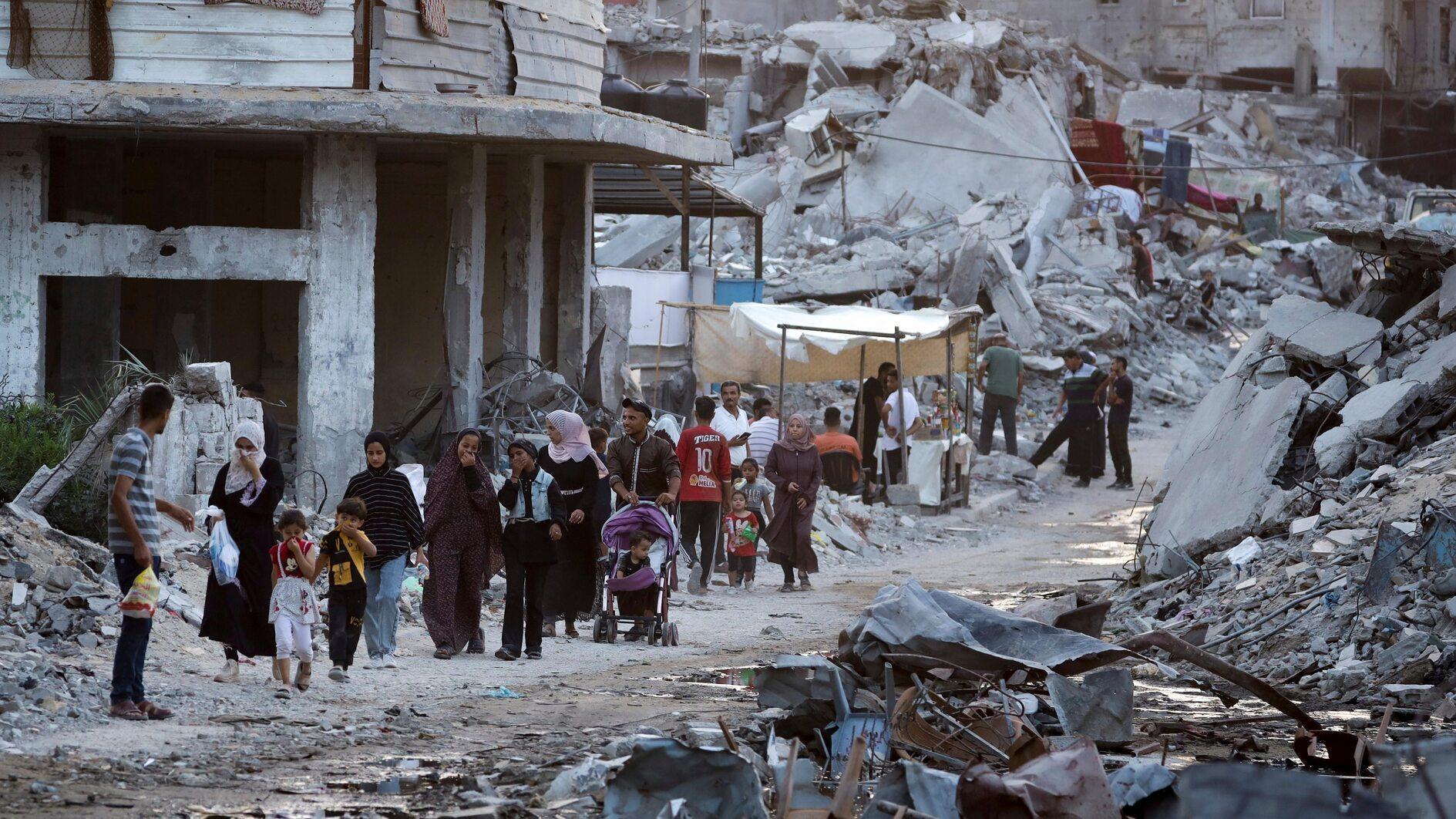
A Hamas official said Sunday the Palestinian group was ready to discuss a hostage release deal with Israel even without a "complete" ceasefire in the Gaza Strip.
The apparent easing of Hamas's position comes as long-stalled diplomatic efforts to secure a ceasefire and hostage release have gathered pace with a new proposal and meetings hosted by Qatari and Egyptian mediators.
"Hamas had previously required that Israel agree to a complete and permanent ceasefire," the top official told AFP as the war entered its 10th month.
But mediators have offered assurances "that as long as the... negotiations continued, the ceasefire would continue", said the official, speaking on condition of anonymity.
Israel, which vowed to destroy Hamas in response to the group's Oct. 7 attack that sparked the war, has repeatedly rejected demands for a permanent ceasefire.
U.S. President Joe Biden announced a plan in late May that included an initial six-week truce and the exchange of hostages held by Hamas for Palestinian prisoners detained in Israel.
Talks quickly stalled but a U.S. official said Thursday that a new response from Hamas "moves the process forward and may provide the basis for closing the deal".
Egypt's state-linked Al-Qahera News said late Saturday that Cairo was "hosting Israeli and American delegations" and mediators were in contact with Hamas amid "intensive Egyptian meetings this week with all parties".
In Israel, anti-government protesters demanding a hostage release deal blocked traffic in the commercial hub of Tel Aviv on a nationwide "disruption day" from 6:29 am, the time Hamas launched their attack on Oct. 7.
Data scientist Yoni Peleg, 34, said protesters were crying "out for help... to end the war" and pressure Prime Minister Benjamin Netanyahu's government to secure the release of the remaining hostages.
Israel has said it would send a delegation to continue talks with Qatari mediators, though a government spokesman said Friday there were still "gaps" with Hamas.
An official with knowledge of the mediation said U.S. Central Intelligence Agency (CIA) director William Burns would also go to Qatar this week.
A statement Sunday from Netanyahu's office said that "any deal will allow Israel to return and fight until all the goals of the war are achieved".
Schools hit
Israel launched its war on Gaza in retaliation for the Hamas' Oct. 7 attacks that resulted in the deaths of more than 1,190 people, mostly civilians, according to Israeli official figures.
Hamas seized 251 hostages. Of these 116 remain in Gaza, although the army says 42 of them are dead.
Israel's offensive has killed more than 38.100 people in Gaza, mostly civilians, according to the Hamas-run territory's health ministry.
Witnesses reported strikes and shelling in the central Bureij refugee camp, the far-southern Rafah city and elsewhere in Gaza.
Medics and rescuers said at least nine people were killed in three strikes in central Gaza and Gaza City, in the north of the coastal territory.
An AFP correspondent said Israeli drones were firing in Gaza City's Shujaiya district, which has seen intense battles for nearly two weeks.
The civil defense agency in Hamas-run Gaza said on Monday a second Israeli strike in two days on a school sheltering displaced families killed at least four people, as the U.N. condemned the targeting of its shelters.
The Israeli military said that in Shujaiya, its troops killed "several" militants and dismantled militant infrastructure.
The military issued on Sunday an evacuation order for a nearby area of Gaza City. Similar orders in the past have preceded military incursions.
Israeli forces were also "conducting operations" in Rafah and around the municipality building in neighbouring Khan Yunis, which according to the military was being used by Hamas fighters.
The latest Gaza health ministry toll includes 16 people killed Saturday in a strike on a UN-run school turned shelter in central Gaza's Nuseirat refugee camp.
Another strike Sunday on a church-run school in Gaza City, also sheltering displaced Palestinians, killed at least four people, said the civil defence agency.
Israel's military said militants had operated in the area of both schools.
The army announced a soldier was killed in southern Gaza, adding to a military toll of more than 320 since ground operations began in late October.
Plea for 'caution'
Lebanon's Hezbollah movement, a Hamas ally, said it carried out its "largest" aerial operation of the war, sending drone "squadrons" against Israel's Mount Hermon intelligence base in the annexed Golan Heights.
Defense Minister Yoav Gallant had earlier visited the area.
Israel's military reported no injuries after it said an explosive drone came down "in an open area" in the Mount Hermon region.
Since the Gaza war began, Israeli forces and Hezbollah have exchanged almost daily cross-border fire, with attacks and rhetoric escalating in recent weeks, raising fears of all-out war.
Israel on Saturday struck deep inside eastern Lebanon, killing a Hezbollah operative. The Lebanese group said the Mount Hermon strike was in response to that killing, as was an earlier strike against an Israeli army base west of Tiberias.
Israeli officials reported four people wounded by shrapnel, including a 31-year-old man who was "in serious and stable condition", according to the Galilee Medical Center.
Britain's new Prime Minister Keir Starmer, in his first telephone conversation with Netanyahu on Sunday, said the border clashes were "concerning" and urged all sides to exercise "caution".
Starmer also "set out the clear and urgent need for a ceasefire" in Gaza, a spokesperson said.
In the Golan Heights Gallant said "we will continue fighting" Hezbollah even if a deal with Hamas is reached, according to his office.